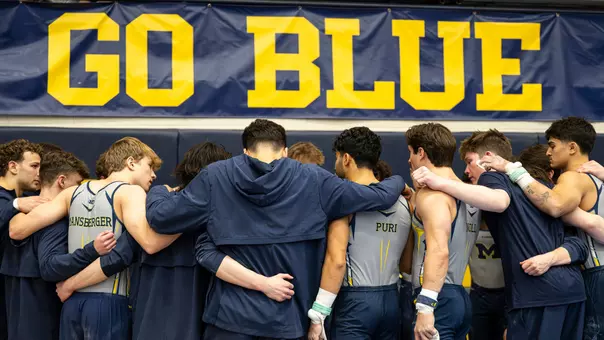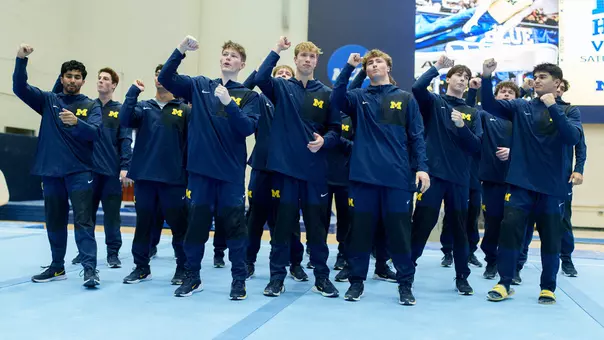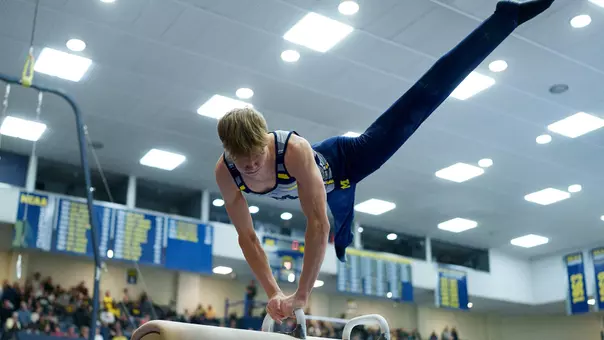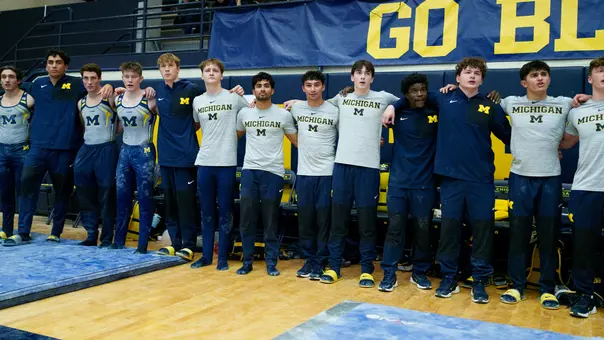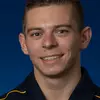
Scholar Stories: Unique Path, Dedication Lead Paul to U-M, Biomedical Engineering
12/9/2020 10:55:00 AM | Men's Gymnastics, Features
Continuing the series that began in 2016-17, each Wednesday MGoBlue.com will highlight a Michigan student-athlete and their academic pursuits. These are our Scholar-Athlete Stories, presented by Absopure.
By Brad Rudner
Back on March 7, days before the world seemingly shut down due to COVID-19, Thomas Paul and the University of Michigan men's gymnastics team were competing in a tri-meet against Illinois and Penn State, both top-10 teams and programs which would have challenged Michigan at the Big Ten Championship.
Paul is a still-rings and high-bar specialist and was to be a part of the lineup that day. During his routine, in the first event of the meet, Paul felt something pop in his arm. He knew all too well what it meant.
For the fourth time in less than three years, the injury bug had bitten him again. Two years before, as a sophomore, he tore the ulnar collateral ligament (UCL) in his elbow, an injury commonly found in baseball pitchers for which "Tommy John" ligament-replacement surgery is required. Doctors said he would probably never compete on rings again.
In the past, there was a torn meniscus in his knee (surgery) and a torn labrum in his shoulder (no surgery).
This injury was different. Nearing the end of his career, Paul could have hung it up, and really, who would have blamed him?
"After my bicep, I said, 'That's it. That's my career.' I thought it was the nail in the coffin," he said. "I can't tell you how many times I've walked into doctor's offices thinking about that."
But just as he did each time before, Paul made the choice to come back. He was not about to let injuries dictate the end of his time in a sport into which he has poured nearly a decade of his life.
"There are days where I think to myself, 'Is it smart to keep doing this?' Some days, I feel hurt, but this year, the frequency has decreased. I trust in the rehab and I trust our athletic medicine staff. I've been able to get through everything by learning to adapt. You get through the hard days by believing better days will come."
Paul is from Morgantown, W.Va., itself a large and raucous college town, though the sport of men's gymnastics is not exactly popular there. Paul was the only Level 10 gymnast in the state and regularly dominated at state-wide competitions. Even in his own gym, the training environment was one conducive to younger kids. Many would sign up, do it for a few years and then quit.
His father, Stephen, was a gymnast back in the 1970s at the University of Pennsylvania. Of the three children in the Paul family, Thomas was the only one that did not start out in gymnastics.
He played baseball and even ran cross country for a season, but it was skateboarding, of all things, that hooked him.
"That was my gymnastics before gymnastics," Paul said. "Once I found it, I instantly quit everything else."

There are fewer than 20 universities around the country that sponsor men's gymnastics at the varsity level. His hometown school, West Virginia University, is not one of them. Because he started later, Paul knew he was not going to be an Olympian. In his college search, he came across a hype video on YouTube from 2013.
The featured team? Michigan.
"Seeing that, I knew I wanted to be a part of that culture," he said. "I never had a team until going to college. That as the goal from the beginning."
"I went on a few trips and had good times at other schools, but coming here, I felt at home. I knew it was where I wanted to go. It's the University of Michigan. No other school can compare."
Paul graduated Magna Cum Laude this past spring with a degree in biomedical engineering and is pursuing a master's degree in the same field as a graduate student. Because of all the injuries, Paul had the option for a fifth year of eligibility -- and took it.
"If I wasn't planning on pursuing higher degrees, I wouldn't have done it," he said. "I was going to be here already. Might as well do it while I can."
However, coming back meant Paul had to pay his own way. His four-year scholarship had expired, so he applied to become a graduate student instructor (GSI). He figured it would be a way to cover tuition. He did not think it would lead to anything, but wound up with an opportunity in the Department of Chemistry. He taught a lab (Chem 125) on Tuesdays and Wednesdays this fall from 2-5 p.m.
Paul also works in Brooks Lab, a research group focused on the loss of skeletal muscle mass and strength that occurs in old age. This fall, he was in the lab three days a week for three to four hours each time.
"A lot of people in BME (biomedical engineering) work on medical devices or prosthetics," Paul said. "The research that I do currently looks at muscle injury, how age affects muscle atrophy and healing."
"There's always a solution to the problem. That's what engineers do."
Paul's ultimate goal is to one day be an orthopedic surgeon. Perhaps it is fitting considering his own injury history, Paul strives to be one of the team physicians at Michigan, fixing the same elbow and shoulder injuries that he himself had.
Getting to that point means first going to medical school. To date, Paul has applied to 13 schools as of early December, with Michigan near the top of his list.
He also is not completely shutting the door on a potential sixth year of gymnastics. Because of the cancellations and postponements due to COVID-19, the NCAA granted an extra year of eligibility for every student-athlete. Paul admits he is leaning toward retiring, but in the back of his mind, he wonders if anyone has balanced medical school, teaching, lab research and athletics.
The common theme: all of those are opportunities that the University of Michigan has provided. Without any one of them, is Paul on the path he is today?
"People have asked me, 'Wouldn't it be easier if there wasn't gymnastics?'" Paul said. "But I truly believe I wouldn't have done as well or have these career aspirations without it. Being a part of the team, repping that block M on my chest, that's something I'll cherish forever."
"The relationships I've built, the culture I've learned and the work ethic and mindset instilled within me is the reason I'm heading in the direction I'm in. I owe everything to this school. It's one of the most special experiences of my life."

